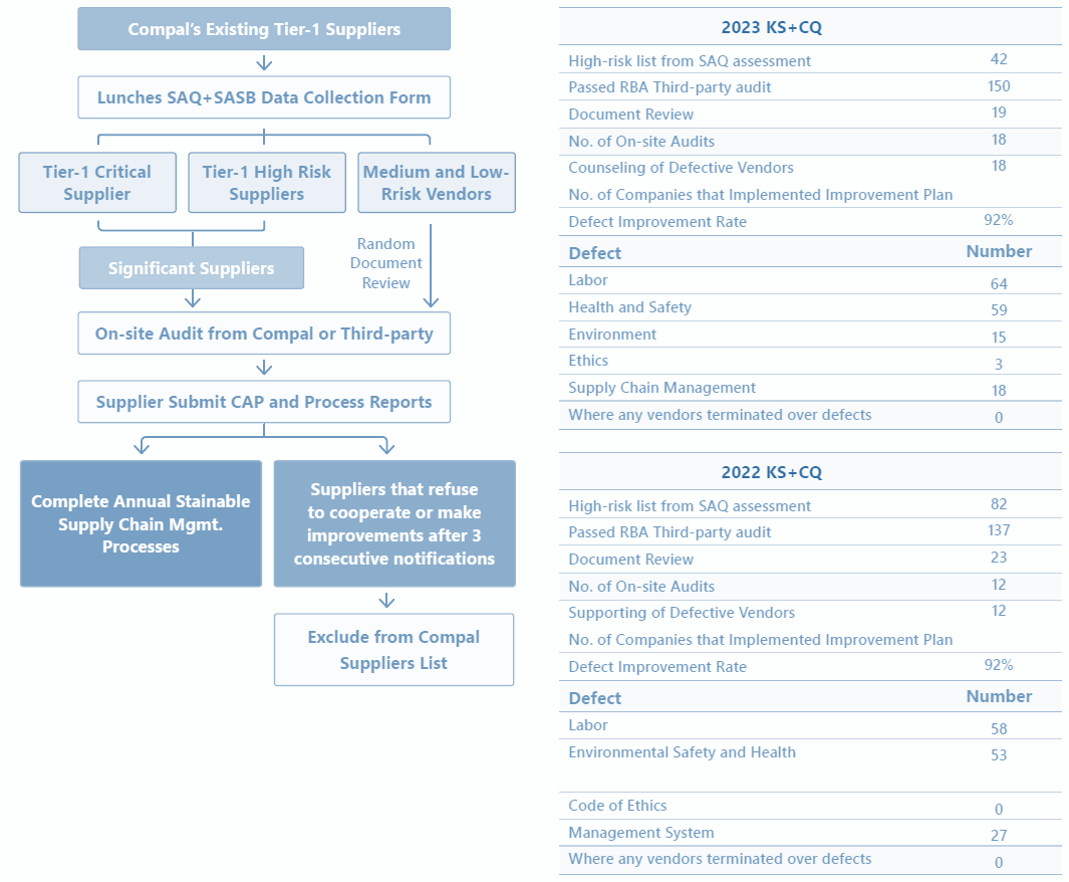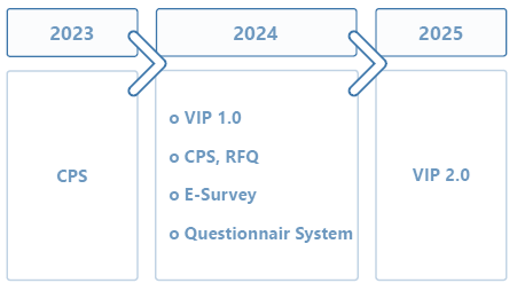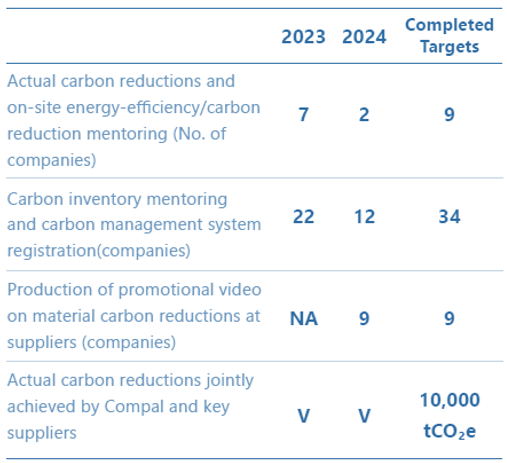Supplier Audit and Sustainability Capability
Supplier Audit
Compal conducts random on-site factory audits of existing qualified suppliers every year based on transaction amount and risk. The audits take business continuity planning (BCP) into account and suppliers are selected on the basis of large annual transactions and risk of supply chain disruptions. Compal strengthened sustainable supply chain management by introducing the ESG concept into the audit process in 2022. The supplier audit in 2023 was expanded to take (1) SAQ score and (2) Inherent perpetual risk. These include use of hazardous chemical and radioactive materials, labor intensive operations (more than 500 workers), and generation of toxic/ restricted waste etc. Those with low SAQ scores or high inherent sustainability risks will be audited for enhanced supervision and tracing. The audits will be conducted by the CSR audit task force. Suppliers will be audited using the RBA standard in accordance with the “Supplier CSR Evaluation and Identification Procedure. ”The audit standard is divided into four levels based on the RBA process: Priority, Major, Minor, and Risk(Non-conformance). Priority items are serious non-conformities that have a critical and immediate impact on factory operations. Compal values the completion of on-site audits by internationally accredited third parties for suppliers and regularly count the key suppliers on the number of factory locations that have undergone independent third-party audits such as RBA VAP. Compal also encourages suppliers to undergo third-party audits. A total of 150 suppliers passed RBA VAP and non-VAP audits.
Compal requires suppliers to devise and execute improvement plans for all levels of defects. Suppliers receive support on the execution of improvement plans including guidance and recommendations. For supplier improvements on RBA issues, they are first required to strengthen their training on RBA standards, collect customer and RBA-related requirements, then identify and assess their risk introduction policy. Next is the sharing of common problem areas and improvement measures. Compal also tracks Priorit non-conformance and actively push for their correction by suppliers. In 2023,Compal’s Kunshan Plant and Chongqing Plants completed on-site audits for 18 suppliers. The audits found existing social risks at all 18 suppliers with the main deficiencies being labor-related such as excessive work hours, social insurance, and expired certifications, with 64 major non-conformance identified. Assistance and improvement plans consisted of encouraging suppliers to establish automated processes, optimization of shift rosters, and training of multi-skilled workers to improve productivity; 95 minor non-conformance were also identified including improper enforcement of environmental monitoring, occupational safety, and emergency preparedness; assistance and improvement recommendations included requiring
suppliers to conduct additional periodic inspections of plant safety equipment and internal audits, hosting internal education and training, as well as additional employee, supplier training on RBA standards and related knowledge, and other management plans.
suppliers to conduct additional periodic inspections of plant safety equipment and internal audits, hosting internal education and training, as well as additional employee, supplier training on RBA standards and related knowledge, and other management plans.
For such oversights, in addition to asking the suppliers to improve before a specific deadline and submit an improvement report, Compal will also conduct random audits for high-risk suppliers every year to eliminate environmental health and safety defects for workers. Compal completed the follow-up and reviews on the outcome of supplier audit within the same year. All 18 suppliers carried out improvements to defects so improvement rate was 100% (all 18 suppliers). Defect improvement rate was 92% and Compal is continuing to followup on excessive work hours at suppliers. If a high-risk supplier is notified three consecutive times but made no substantive improvements, Compal will consider reducing the number of new projects that the supplier can receive or cut back on future purchases. In serious cases, the supplier will be removed from the qualified suppliers list.

Building Supplier Sustainability
Supplier Conference
 Each year, the Procurement Center and Safety Regulation and Environmental Protection Affairs Department organizes the Supplier Conference jointly. Meeting format switched to online communication and conferencing between 2020 ~ 2021 due to COVID-19. In 2022,third party consulting company was also invited to participate in the Supplier Conference, and contents related to global green product regulatory updates and implementation guidelines, RBA VAP v7.0 updates, conflict minerals, introduction to Compal’s supplier management system and environmental education in the supply chain were explained to 205 suppliers attending the Supplier Conference. In 2023,to accelerate supply chain’s participation in net zero emissions and carbon reduction, Compal invited 34 key suppliers to join Compal’s ONE+N electronic industry supply chain net zero acceleration program, and a physical Supplier Conference was also held on September 13, 2023. Compal continues to communicate the latest trend of sustainable supply chain to suppliers through the Supplier Conference and also works with suppliers to improve the ESG performance continuously.
Each year, the Procurement Center and Safety Regulation and Environmental Protection Affairs Department organizes the Supplier Conference jointly. Meeting format switched to online communication and conferencing between 2020 ~ 2021 due to COVID-19. In 2022,third party consulting company was also invited to participate in the Supplier Conference, and contents related to global green product regulatory updates and implementation guidelines, RBA VAP v7.0 updates, conflict minerals, introduction to Compal’s supplier management system and environmental education in the supply chain were explained to 205 suppliers attending the Supplier Conference. In 2023,to accelerate supply chain’s participation in net zero emissions and carbon reduction, Compal invited 34 key suppliers to join Compal’s ONE+N electronic industry supply chain net zero acceleration program, and a physical Supplier Conference was also held on September 13, 2023. Compal continues to communicate the latest trend of sustainable supply chain to suppliers through the Supplier Conference and also works with suppliers to improve the ESG performance continuously.Procurement System Platform
 The Supplier Opinion contact window was added to the Compal Procurement System (CPS) platform in 2015 to provide a better communication channel with suppliers. In 2023, Compal began working on an upgrade to the Vendor Integration Portal. The upgrade and integration of the system platform will lead more efficient fulfilment of due diligence on the various management policies in the ESG sustainable supply chain and demonstrate Compal’s commitment to working together with suppliers on sustainability.
The Supplier Opinion contact window was added to the Compal Procurement System (CPS) platform in 2015 to provide a better communication channel with suppliers. In 2023, Compal began working on an upgrade to the Vendor Integration Portal. The upgrade and integration of the system platform will lead more efficient fulfilment of due diligence on the various management policies in the ESG sustainable supply chain and demonstrate Compal’s commitment to working together with suppliers on sustainability.Supplier Capability Building Plan
Learning Platform - ESG GO Training Platform https://www.compal.com/esg/go/

The mission of the “ESG GO Training platform” launched by Compal in 2023 is to strengthen the partnership between Compal and suppliers through the sharing of information and knowledge. The Compal “ESG GO Training platform” has so far shared a series of online courses related to environmental sustainability, social responsibility, corporate governance and green energy and manufacturing technologies. Compal’s sustainability goals and actions on carbon reduction and net zero are promoted through ESG GO Training platform courses and shared information. We also hope to provide suppliers with even more professional knowledge and skills that will boost overall sustainability action and competitiveness. In the future, we will continue to plan and expand the courses in the “ESG GO Training platform” to enhance the communication and cooperation with suppliers, and to expand the scope of participating suppliers and stakeholders, in order to facilitate
the experience learning and sharing with each other, thereby achieving the goal of economic and sustainable development jointly.
the experience learning and sharing with each other, thereby achieving the goal of economic and sustainable development jointly.
Mentor-Based Approach to Carbon Reduction
 To achieve the goal of Net Zero by 2050 by taking action on climate change and carbon reduction issues, Compal has adopting a mentor-based approach to promote material carbon reduction actions by vendors in the supply chain. Up to a hundred representatives from 34 suppliers also gathered at the “ON+N Electronic Supply Chain Net Zero Acceleration Swearing-in-Ceremony” to proclaim their commitment to net zero and carbon reduction. The 9 suppliers with higher combined carbon emissions (panel makers, mainboard makers, bearing vendors) were invited to join in realizing the target of reducing carbon emissions by 10,000 tCO₂e within two years and to continue developing carbon reduction plans that enhance the low-carbon competitiveness and resilience of the industry. The program will bring in external energy-efficiency and carbon reduction experts to set up an industry low-carbon mentoring team for sharing Compal’s own implementation outcomes. Industry best practices in carbon management will also provided for reference to help suppliers devise their carbon reduction plans. Mentoring on carbon footprint mentoring will be carried out to encourage suppliers to invest/introduce highefficiency technologies and processes. Optimization of system energy efficiency will help reduce energy consumption and carbon emissions. A variety of supply chain training courses and seminars will be organized for sharing international ESG trends. Carbon reduction targets will be progressively realized through continued education and cooperation. Compal looks forward to expanding our carbon reduction model to the entire electronic industry supply chain. We will continue to assist suppliers with reducing the impact of their low-carbon transition, and work with our customers and suppliers to realize the development
To achieve the goal of Net Zero by 2050 by taking action on climate change and carbon reduction issues, Compal has adopting a mentor-based approach to promote material carbon reduction actions by vendors in the supply chain. Up to a hundred representatives from 34 suppliers also gathered at the “ON+N Electronic Supply Chain Net Zero Acceleration Swearing-in-Ceremony” to proclaim their commitment to net zero and carbon reduction. The 9 suppliers with higher combined carbon emissions (panel makers, mainboard makers, bearing vendors) were invited to join in realizing the target of reducing carbon emissions by 10,000 tCO₂e within two years and to continue developing carbon reduction plans that enhance the low-carbon competitiveness and resilience of the industry. The program will bring in external energy-efficiency and carbon reduction experts to set up an industry low-carbon mentoring team for sharing Compal’s own implementation outcomes. Industry best practices in carbon management will also provided for reference to help suppliers devise their carbon reduction plans. Mentoring on carbon footprint mentoring will be carried out to encourage suppliers to invest/introduce highefficiency technologies and processes. Optimization of system energy efficiency will help reduce energy consumption and carbon emissions. A variety of supply chain training courses and seminars will be organized for sharing international ESG trends. Carbon reduction targets will be progressively realized through continued education and cooperation. Compal looks forward to expanding our carbon reduction model to the entire electronic industry supply chain. We will continue to assist suppliers with reducing the impact of their low-carbon transition, and work with our customers and suppliers to realize the developmentgoal of net zero sustainability.
Promotion of Compal Ervironmental Policy
Compal strives to implement our environmental policy and carbon reduction projects in order to reduce our environmental impact, promote sustainable development, and become a socially and environmentally responsible enterprise. Compal is planning to invite tier-1 suppliers to take part in the CDP in 2024. Key suppliers will also issued an Environmental Sustainability Commitment Letter that is to be signed and returned. Suppliers will be required to focus on low-carbon materials and processes as well as implement product life cycle assessments in order to boost productivity and reduce
environmental impact. Compal’s carbon reduction and renewable energy targets are published on the Compal website (https://www.compal.com/) and Compal ESG GO Training platform (https://www.compal.com/esg/go/). Suppliers are required to actively participate in carbon reduction operations and provide material support for Compal’s vision on integration of technological innovation and environmental sustainability, and carbon reduction targets Targets to be jointly accomplished with the supply chain
environmental impact. Compal’s carbon reduction and renewable energy targets are published on the Compal website (https://www.compal.com/) and Compal ESG GO Training platform (https://www.compal.com/esg/go/). Suppliers are required to actively participate in carbon reduction operations and provide material support for Compal’s vision on integration of technological innovation and environmental sustainability, and carbon reduction targets Targets to be jointly accomplished with the supply chain
1. Reduce the carbon emissions of the supply chain as a whole
2. Expansion of green supply chain
3. Development of smart and renewable energy
3. Development of smart and renewable energy
Updated on July 17, 2024
